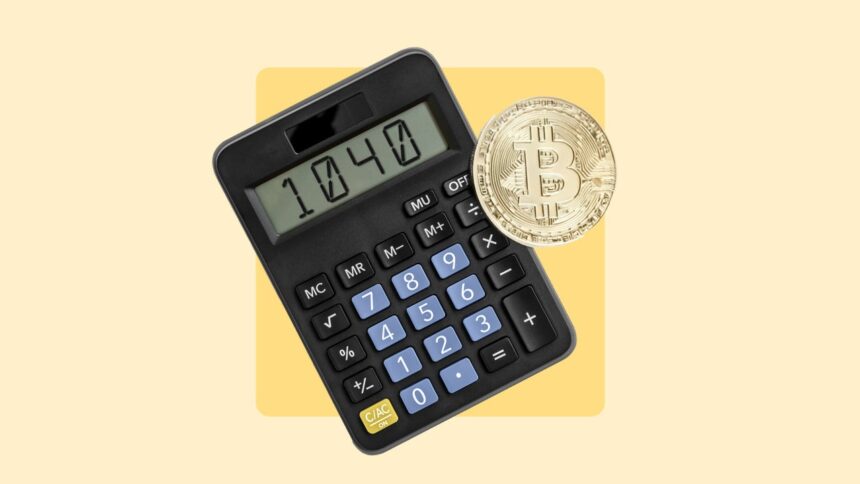With the staggering rise and fall of some cryptocurrencies corresponding to Bitcoin and Ethereum, crypto merchants might have severe tax questions on their minds. The Inner Income Service (IRS) is stepping up enforcement efforts, and even those that maintain the forex — not to mention commerce it — want to verify they don’t run afoul of the legislation. That may be simpler to do than you assume, given how the IRS treats cryptocurrency.
“It’s a very massive enforcement space for the IRS proper now,” says Brian R. Harris, tax legal professional at Fogarty Mueller Harris, PLLC in Tampa. “They’re producing a whole lot of publicity in going after individuals who maintain, commerce or use cryptocurrency. These folks is usually a goal for audit or compliance verification.”
Whereas one of many promoting factors of Bitcoin, for instance, has been its anonymity (or a minimum of semi-anonymity), authorities have been enjoying catch-up lately with some success.
“The IRS and FBI are getting higher at monitoring and tracing Bitcoin as a part of legal investigations,” says Harris. And so they can freeze belongings, if wanted, he provides.
So it’s all of the extra motive for many who transact in well-liked cryptocurrencies to know the legislation and what taxes they could incur. The excellent news: The IRS typically treats cryptocurrencies equally to the way it treats different capital belongings corresponding to shares and bonds. The unhealthy information: That therapy makes it tough to make use of cryptocurrency to purchase items and providers.
Listed here are various key issues you’ll want to find out about cryptocurrency taxes and keep on the suitable aspect of the legislation.
8 essential issues to find out about crypto taxes
1. You’ll be requested whether or not you acquired, bought or used cryptocurrency
Your tax return requires you to state whether or not you’ve made some varieties of transactions in cryptocurrency. In a transparent place close to the highest, Type 1040 asks whether or not taxpayers acquired, bought, despatched, exchanged, gifted or in any other case disposed of a digital asset at any time within the tax yr.
So that you’re on the hook to reply definitively whether or not you’ve transacted in cryptocurrency, placing you able to probably misinform the IRS. For those who don’t reply truthfully, you possibly can be in additional authorized jeopardy, and the IRS doesn’t look kindly on liars and tax cheats.
Most U.S. crypto homeowners haven’t reported their actions to the IRS, in accordance with a current examine by Divly, an organization centered on easing the burden of crypto taxation. Solely an estimated 1.62 p.c of U.S. crypto homeowners reported their holdings to the IRS in 2022.
Nonetheless, taxpayers who solely bought digital forex with actual forex aren’t obligated to reply “sure” to the query. The IRS has additionally stated that those that merely maintain digital belongings or switch them between their very own crypto wallets may additionally reply “no” to the query.
Nonetheless, the emergence of Bitcoin exchange-traded funds in January 2024 might shake issues up a bit on future tax returns. Traders who bought certainly one of these funds could also be questioning if they need to reply “sure” to the IRS query on their return.
“I’d advise shoppers to err on the aspect of warning,” says Harris. “I’d examine sure on that.”
Answering sure received’t essentially incur a tax legal responsibility, he explains. It’s the precise achieve or loss on a sale that may decide whether or not you owe taxes.
2. You don’t escape being taxed simply since you didn’t get a 1099
With a financial institution or brokerage, you (and the IRS) sometimes get a Type 1099 reporting the revenue you’ve acquired through the yr. Now crypto brokers and exchanges have to supply related reporting. As of Jan. 1, 2025, they need to report transactions and ship shoppers a Type 1099-DA for tax functions. Beforehand, shoppers won’t have acquired a report on their trades.
However the lack of a 1099 received’t allow you to escape any tax legal responsibility, and also you’ll nonetheless must report your good points and pay tax on them. Nonetheless, it’s not all unhealthy information: For those who needed to take a capital loss, you possibly can deduct that in your return and scale back your taxable revenue.
“This elevated reporting might trigger some points for many who haven’t disclosed cryptocurrency transactions earlier than,” says Harris. “It’s in folks’s higher curiosity to begin reporting.”
Even should you’ve filed taxes years earlier than and assume you’ve escaped taxes on crypto good points, the IRS can nonetheless come again to you and request you to pay up.
3. Simply utilizing crypto exposes you to potential tax legal responsibility
You may assume that should you solely use — however not commerce — cryptocurrency you’re not answerable for taxes.
Not true!
Any time you trade digital forex for actual forex, items or providers, it’s possible you’ll create a tax legal responsibility. You’ll create a legal responsibility if the worth you notice in your cryptocurrency — the worth of the great or actual forex you obtain — is larger than your value foundation within the cryptocurrency. So should you get extra worth than you place into the cryptocurrency, you’ve received your self a tax legal responsibility.
After all, you possibly can simply as nicely have a tax loss, if the worth of products, providers or actual forex is under your value foundation within the cryptocurrency.
In both case, you’ll must know your value foundation to make the calculation.
It’s essential to notice that this isn’t a transaction tax. It’s a capital good points tax — a tax on the realized change in worth of the cryptocurrency. And like inventory that you just purchase and maintain, should you don’t trade the cryptocurrency for one thing else, you haven’t realized a achieve or loss.
4. Positive factors on crypto buying and selling are handled like common capital good points
So that you’ve realized a achieve on a worthwhile commerce or buy? The IRS typically treats good points on cryptocurrency the identical means it treats any sort of capital achieve.
That’s, you’ll pay abnormal tax charges on short-term capital good points (as much as 37 p.c in 2024 and 2025, relying in your revenue) for belongings held lower than a yr. However for belongings held longer than a yr, you’ll pay long-term capital good points tax, seemingly at a decrease fee (0, 15 and 20 p.c).
And the identical guidelines for netting capital good points and losses in opposition to one another additionally applies to cryptocurrencies. So you possibly can deduct capital losses and notice a web lack of as much as $3,000 every year. In case your web losses exceed this quantity, you’ll have to hold them over to the following yr.
5. Crypto miners could also be handled otherwise from others
Do you mine cryptocurrency as a enterprise? You then may have the ability to deduct your bills, as a typical enterprise would. Your income is the worth of what you produce.
“For those who mine cryptocurrency, you notice revenue on the honest market worth, in order that’s your foundation within the cryptocurrency,” says Harris. “If it is a commerce or enterprise, your bills could also be deductible.”
However that final bit is the important thing level: It’s a must to be working a commerce or enterprise to qualify. You’ll be able to’t function your mining rig as a interest and luxuriate in the identical deductions as an precise enterprise.
6. A present of crypto is handled the identical as different items
For those who’ve given cryptocurrency to somebody, maybe a youthful relative as a option to spark curiosity, your reward might be handled the identical means as any related reward could be. So it may be topic to the reward tax if it’s over $18,000 in 2024 or $19,000 in 2025. And if it comes time for the recipient to promote the reward, the price foundation stays the identical because the giver’s value foundation.
That stated, you possibly can escape the reward tax should you go over the annual threshold, by making the most of the lifetime exemption.
7. Inherited cryptocurrency is handled like different inherited belongings
Inherited cryptocurrency is handled like different capital belongings which are handed from one era to a different. They could be topic to property taxes if the property exceeds sure thresholds ($13.61 million in 2024; $13.99 million in 2025).
Like inventory, cryptocurrency enjoys a stepped-up value foundation to the honest worth on the day of demise. So typically, cryptocurrency is handled for most individuals like a typical capital asset, says Harris.
8. The wash-sale rule doesn’t apply to cryptocurrency
Whereas the IRS treats cryptocurrency principally because it does capital belongings, it takes a very totally different strategy in terms of wash gross sales. And that’s truly helpful for crypto merchants.
Usually, when a dealer sells an asset and declares a loss, the dealer should not have bought the asset (or a really related one) inside 30 days earlier than or after the sale. If the dealer repurchases the asset inside that 30-day window, it’s declared a wash sale. So the loss can’t be claimed as a write-off till the dealer refrains from buying the asset inside a minimum of the 30-day window.
However the wash-sale rule doesn’t exist for cryptocurrency. So merchants can promote their place, e-book a loss after which actually repurchase the asset moments later and nonetheless have the ability to declare the loss. That rule is advantageous as a result of it permits merchants to seize the total worth of the tax loss whereas nonetheless being invested, successfully, that means it’s riskless to really avail your self of the tax write-off.
However legislators have been discussing closing this loophole, so it could not exist for much longer.
Backside line
It may be surprisingly onerous to really use cryptocurrencies, from monitoring your value foundation, noting your efficient realized value after which probably owing tax. Plus, the IRS is stepping up enforcement and surveillance on potential tax evasion by wanting extra carefully at who’s exchanging cryptocurrencies.











